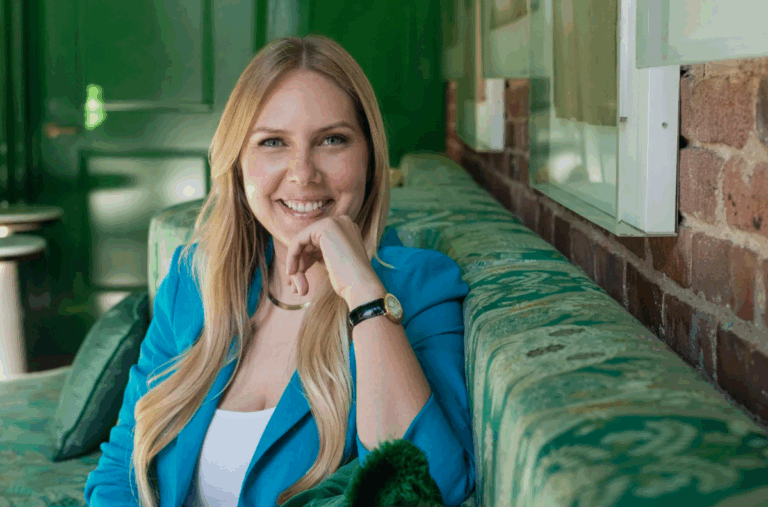Five years ago, investor Katelin Holloway made what she calls a “literal moon shot” investment. A founding partner of the generalist venture firm Seven Seven Six admits she and her team had “no clue” what rocket company Stoke Space was talking about when they pitched the firm on its reusable launch technology. “We knew full well we were not the specialist,” she says.
Since then, Holloway has also invested in Interlune, a company planning to harvest helium-3 from the moon and sell it back to Earth for quantum computing and medical imaging applications.
Holloway is well aware of the skepticism these bets might attract. At the same time, her journey from space novice to investor reflects a broader change in venture capital, as VCs without aerospace engineering degrees increasingly back space startups. In fact, global venture investment in space technology reached $4.5 billion across 48 companies as of July, according to PitchBook; that’s more than four times the amount that space startups attracted in 2024.
What’s driving this trend? For starters, SpaceX and other companies have substantially reduced launch costs, making space accessible to founders with applications-focused business models. “We are literally as a species sitting on the precipice of space becoming part of our day-to-day lives,” Holloway told this editor in a recent episode of TC’s StrictlyVC Download podcast. “And I truly do not think the world understands that or is ready for it.”
That has allowed VCs to look past companies that build rockets to startups that use space-based data and infrastructure for new applications like climate monitoring, intelligence gathering, and communications. They’re also betting on orbital logistics, in-space manufacturing, satellite servicing, and lunar infrastructure development. Companies like Interlune represent this new category. For investors like Holloway, the appeal often lies at the “space tech meets climate tech” intersection, meaning startups that want to avoid repeating Earth’s environmental mistakes in space.”
Geopolitical tensions are also making defense-related space startups attractive because China’s rapidly advancing space capabilities are driving increased U.S. investment. VCs can be a nervous lot, and defense spending – knowing the U.S. government provides a reliable customer base and validation for emerging technologies – gives them greater confidence in the commercial viability of space ventures. At the Department of the Air Force Summit in March, Defense Secretary Pete Hegseth said, “I feel like there’s no way to ignore the fact that the next and most important domain of warfare will be the space domain.”
Numerous U.S. defense-focused space startups closed sizable rounds this year, including military-class orbital systems developer True Anomaly, which announced a $260 million Series C led by Accel in July; and satellite manufacturer K2 Space, which is right now working on its first government mission and closed a $110 million round in February co-led by Lightspeed Venture Capital and Altimeter Capital. The defense angle adds sheen to space investments that might otherwise seem too risky. Indeed, Holloway notes that helium-3, the gas that Interlune plans to harvest, has national security applications, too, including detecting nuclear weapon movements.
Techcrunch event
San Francisco
|
October 27-29, 2025
AI is creating even more momentum, including at the intersection of geospatial analytics and intelligence. In March, for example, the first satellite launched from Fire Sat, a partnership between Google, nonprofit Earth Fire Alliance, and satellite builder Muon Space designed to detect wildfires from orbit. The collaboration, announced last year, plans to deploy more than 50 satellites specifically built for wildfire detection. Earth imaging operator Planet Labs has also teamed up with Anthropic to analyze Earth observation data.
Perhaps most remarkably, the timetable for returns on these investments has shortened to a surprising degree. Traditional space companies required decades to generate returns, but today’s VCs believe they can achieve liquidity within standard 10-year fund horizons. “Our fund model hasn’t changed, so we still have a 10-year horizon,” Holloway explains. “We would not have made this investment if we did not think we could create outsized returns within 10 years.”
That kind of schedule sounds ambitious, but the public markets certainly seem receptive to these new space companies. Space infrastructure company Voyager listed in New York in June with a $1.9 billion market cap and closed its first day up 82% from its IPO price. (Its shares have since fallen roughly 45%.) The 48-year-old space systems manufacturer Karman Space & Defense opened 30% above its listing price in February. (Its shares have risen nearly 60% more since then.)
For Interlune, Holloway envisions potential exits including strategic acquisitions by aerospace or defense giants, energy company purchases, or even a government buyout given the national security implications that she describes.
All these converging forces – cheaper launches, defense spending, AI applications, and compressed timelines for returns – are reshaping who can invest in space. Holloway’s background – from public school teacher to Pixar script supervisor to Reddit’s VP of People & Culture to venture capitalist – highlights the broader skill sets these companies actually need. While she’s self-effacing when it comes to helium-3 harvesting physics, she brings operational chops.
“At the end of the day, a company is a company,” she says. “If you’re bringing humans together to build something hard, you need someone with a background in building strong companies.”
Whether the approach will pay off remains to be seen. The space economy is still mostly untested at scale, and many of these ambitious ventures face technical and regulatory hurdles that more traditional software startups have never encountered. But as more generalist VCs like Holloway place their bets, space is beginning to look less like a specialized niche and more like another buzzy sector where, if you have the operational know-how, you don’t need an aerospace engineering degree.




